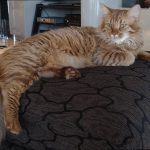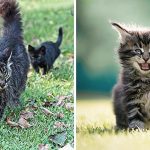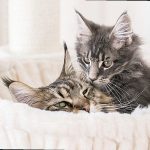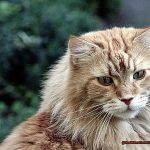Ever wondered why your magnificent Maine Coon, with its majestic presence and impressive size, can still be timid and cautious? As a passionate feline behavior expert, I’ve dedicated years to unraveling the secrets behind their shy demeanor, aiming to shed light on this intriguing aspect of their personality.
Maine Coons, hailing from the rugged forests of Maine, have a rich history that helps explain their inherent shyness. These incredible creatures adapted to survive in harsh conditions, always on high alert for potential threats. It’s no wonder that these survival instincts are deeply rooted in their DNA, making them naturally more wary and cautious than other domestic cats.
But it’s not just their wild origins that contribute to their timid nature. Maine Coons are known for being sensitive souls with introverted tendencies. Unlike more outgoing breeds like Siamese or Bengals, they prefer observing from a safe distance before fully immersing themselves in unfamiliar situations.
Of course, individual experiences and early socialization also shape a Maine Coon’s personality. Limited exposure to different environments and positive interactions during their crucial kittenhood stage can make them more susceptible to developing timid characteristics.
So how can we help our shy Maine Coons thrive? Creating a nurturing environment is key. Patience, understanding, and gradual exposure to new experiences can build trust and confidence over time. Providing safe spaces, vertical climbing structures for exploration, and engaging in play sessions tailored to their preferences all contribute to easing anxiety and enhancing overall well-being.
In the upcoming articles of this series, we’ll delve deeper into specific strategies for helping your timid Maine Coon overcome their shyness and embrace life to the fullest. Join me as we uncover the secrets behind their timid nature and gain a deeper understanding of these gentle giants – our captivating Maine Coons.
Why is my Maine Coon so timid
Maine Coon cats are known for their majestic appearance and friendly personalities. However, some Maine Coons may exhibit timidity, causing concern for their owners. In this blog post, we delve into the reasons behind this behavior and provide insights and tips to help your timid Maine Coon gain confidence and live a happier life.
Genetic Predisposition:
Just like humans, cats have unique personalities shaped by genetics. Some Maine Coons may inherit timid traits from their ancestors who had to be cautious in the wild. However, it’s important to note that not all Maine Coons will be timid due to genetics, as individual experiences and environmental factors also play a significant role.
Early Socialization:
Proper socialization during the critical period of 2 to 7 weeks is crucial for a Maine Coon kitten’s development. Limited exposure to different people, animals, and environments during this time can result in timidity. Cats that haven’t had positive interactions may perceive new situations as threats, leading to a timid demeanor.
Traumatic Experiences:
Maine Coons that have experienced abuse, neglect, or accidents may exhibit timidity as a defense mechanism. These cats require extra patience, understanding, and gentle handling to help them regain trust and confidence. Providing a safe and secure environment is essential to help them feel protected.
Environmental Factors:
A stressful living environment can make even the most confident cat feel anxious and timid. Loud noises, frequent disruptions, or changes in routine can contribute to their apprehension. Creating a calm and peaceful environment with designated safe spaces can help alleviate their timidity.
Health Issues:
Timidity in Maine Coons can sometimes be a sign of underlying health problems. Cats in pain or discomfort may become withdrawn and fearful. It’s important to consult with a veterinarian to rule out any medical issues if your Maine Coon’s timidity is sudden or accompanied by other concerning symptoms.
Understanding the Reasons Behind Timidity in Maine Coons
Maine Coon cats are renowned for their majestic appearance and gentle nature. However, if you have a timid Maine Coon, you may wonder how to help them overcome their fears and unleash their inner warrior. In this blog post, we will explore the reasons behind timidity in Maine Coons and share practical tips to support your furry friend.
Genetics – The Shy Gene:
Just as humans inherit certain traits from their parents, Maine Coons can also inherit timidity. If your cat’s ancestors were on the shy side, it is possible that they carry a genetic predisposition for timidity. Patience and understanding are key when dealing with a timid Maine Coon, as it may take time for them to feel comfortable in new situations.
Early Socialization – The Power of Positive Experiences:
Proper socialization during the critical period of 2-7 weeks is vital for a confident Maine Coon. Introduce your kitten to various people, animals, and environments in a positive and gentle manner. This exposure helps them build resilience and reduces their fear response later in life.
Traumatic Experiences – Healing Emotional Wounds:
Maine Coons can carry the emotional scars of traumatic experiences, such as abuse or neglect. Creating a safe and secure environment with consistent routines and plenty of love can help rebuild their trust. Give them space to retreat and provide gentle encouragement to gradually reintroduce them to positive experiences.
Environmental Factors – Zen Zone for Zen Cats:
A calm and predictable environment is essential for timid Maine Coons. Minimize loud noises, sudden changes, and overwhelming stimuli that can trigger anxiety. Designate quiet areas where your cat can retreat when they need solitude or feel overwhelmed.
Boosting Confidence – One Paw at a Time:
Building confidence is a gradual process. Provide interactive toys, puzzle feeders, and vertical spaces like cat trees to encourage exploration and play. Positive reinforcement training can also help boost their self-assurance and strengthen the bond between you and your Maine Coon.
Genetic Predisposition: The Wild Instincts of Maine Coons
Maine Coons have a fascinating genetic predisposition that stems from their rich history as working cats. Let’s explore how these genetic traits affect their behavior and temperament.
Maine Coons have a rich history as working cats:
Maine Coons are believed to be one of the oldest natural breeds in North America, originating from the state of Maine. They were highly valued for their hunting abilities on farms, thanks to their large size, strong build, and agility. These wild instincts are deeply rooted in their genetic makeup.
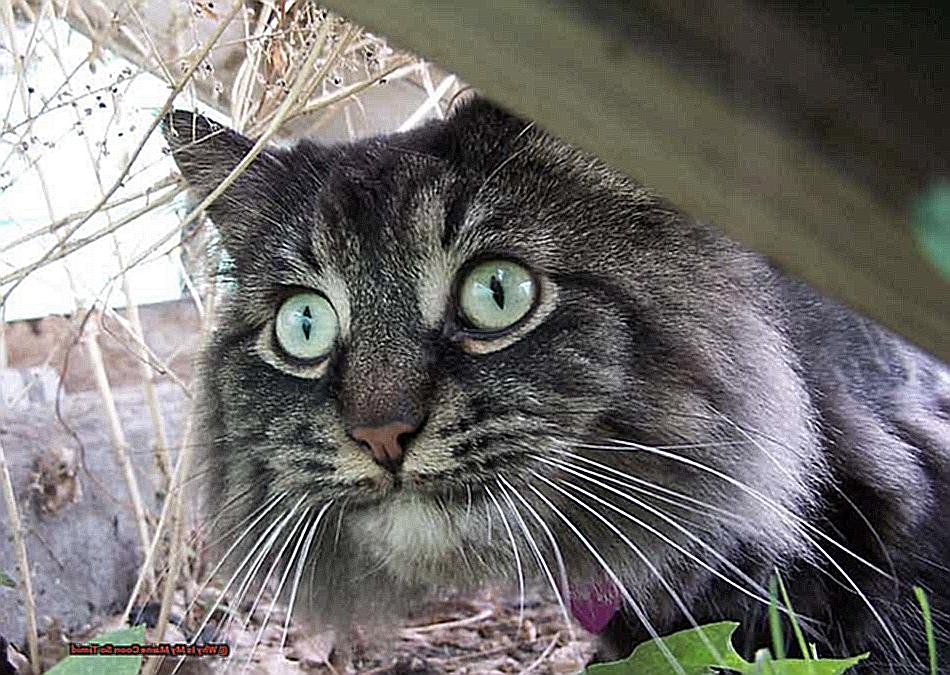
The influence of their ancestors:
Maine Coons are thought to have descended from domestic cats and longhaired cats brought by European sailors to the New World. This interbreeding resulted in the development of the Maine Coon breed. The wild instincts of their ancestors, such as hunting skills and survival instincts, still prevail in Maine Coons today.
The survival instinct:
Timidity in Maine Coons can often be attributed to their survival instinct. In the wild, being cautious and reserved is crucial for their safety. This natural instinct has been passed down through generations, and even though they are now domesticated pets, it can still manifest in certain situations.
Sensitivity to unfamiliar environments:
Maine Coons may exhibit timidity when faced with new experiences or placed in unfamiliar surroundings. Their genetic predisposition to be cautious and alert makes them more sensitive to these situations. They prefer observing from a distance before engaging.
Socialization and early experiences:
Proper socialization plays a significant role in shaping a Maine Coon’s behavior and temperament. Lack of socialization during their early developmental stages may make them more prone to timidity later in life. Positive experiences with various people, animals, and environments help build confidence and overcome their inherent cautiousness.
Individual personalities:
Just like humans, each Maine Coon has its own unique personality traits. While some may naturally be more outgoing and confident, others may be more reserved and timid. Understanding and respecting their individual temperaments is crucial, providing a safe and secure environment where they can feel comfortable being themselves.
Early Life Experiences and Socialization
If you’re a proud Maine Coon parent, you know that these magnificent cats have a unique temperament and behavior. But did you know that early life experiences and socialization play a crucial role in shaping their personalities? In this article, we’ll explore how these experiences can shape the temperament and behavior of your Maine Coon, and provide some tips on how to help them become confident and outgoing cats.
The Critical Period: 2 to 7 Weeks
Just like humans, Maine Coon kittens go through a critical period of socialization between the ages of 2 to 7 weeks. This is the time when they are most receptive to new experiences and learning. During this period, it’s important to expose your kitten to various stimuli, such as different people, animals, sounds, and environments. This will help them become well-adjusted and less timid in their adult life.
Positive Experiences Build Confidence
Positive early experiences are key to building your Maine Coon’s confidence. Make sure to handle your kitten gently and engage in gentle play sessions. Expose them to different environments, both indoors and outdoors (supervised, of course), so they can become familiar with new sights, sounds, and smells. This will help them feel more comfortable in new situations as they grow older.
The Power of Nurturing Caregivers
The presence of nurturing and attentive caregivers during the early weeks is crucial for a Maine Coon’s social development. Shower your kitten with love, affection, and proper care. This will create a secure bond between you and your cat, making them feel safe and less timid.
Choose Reputable Breeders
When getting a Maine Coon kitten, it’s important to choose a reputable breeder who prioritizes early socialization. Kittens from responsible breeders are more likely to have confident personalities compared to those from less responsible sources. Ask the breeder about their socialization practices and visit their facility to see how the kittens are raised.
Addressing Traumatic Experiences
Unfortunately, traumatic experiences or negative interactions during the early life stages can contribute to a Maine Coon’s timidity. If your adopted Maine Coon has an unknown or challenging history, it’s important to provide them with extra patience, understanding, and gradual exposure to new experiences. Create a safe and secure environment for them, avoiding any situations that may cause fear or distress.
Continued Socialization for Lifelong Confidence
Socialization should not stop once your Maine Coon reaches adulthood. Consistent positive interactions, exposure to new people, animals, and environments can help timid cats gradually gain confidence over time. Be patient and understanding as you continue to expose your cat to new experiences throughout their life.
Environmental Factors That May Lead to Fearfulness
Maine Coon cats, known for their large size and gentle demeanor, are generally not considered to be timid or fearful. However, in some cases, certain environmental factors can contribute to their timidity. Understanding these factors can help cat owners provide a supportive and reassuring environment for their Maine Coon.
Lack of Socialization:
Kittens need to be exposed to various people, animals, and environments between the ages of 2 and 7 weeks to develop a confident and well-adjusted personality. If a Maine Coon kitten is not adequately socialized during this critical period, they may become fearful or anxious in unfamiliar situations later in life.
Negative Experiences or Trauma:
Cats have long memories and can hold onto memories of traumatic events, such as being attacked by another animal or experiencing a loud and frightening noise. These negative experiences can create a lasting fear response, causing the cat to be wary and timid in similar situations.
Home Atmosphere:
The overall atmosphere of the home can play a role in a Maine Coon’s level of fearfulness. Loud noises, frequent disruptions, or an unpredictable environment can all make a cat feel unsafe and anxious. Maine Coons thrive in calm and stable environments where they feel secure.
Presence of Dominant Animals:
The presence of other pets or dominant animals in the home can also impact a Maine Coon’s confidence level. If a Maine Coon lives with aggressive or dominant animals that intimidate them, it can lead to fearfulness and withdrawal.
Changes in Physical Surroundings:
Changes in the physical surroundings, such as moving to a new home or rearranging furniture, can be unsettling for Maine Coons. They are creatures of habit and rely on familiar routines and surroundings for a sense of security. Sudden changes or disruptions to their environment can trigger fear and anxiety, making them more timid.
By providing a supportive and reassuring environment, socializing kittens early on, and minimizing traumatic experiences, owners can help their Maine Coons overcome timidity and develop into confident and well-adjusted cats.
Health Issues That Could Cause Timidity in Maine Coons
Maine Coon cats are widely cherished for their friendly and outgoing personalities. However, when these majestic felines display timidity or shyness, it can be a cause for concern. While environmental factors certainly play a role in a Maine Coon’s temperament, it is crucial to consider the potential impact of underlying health issues.
In this article, we will explore the various health problems that could contribute to timidity in Maine Coons, shedding light on the importance of addressing these issues for the well-being of your furry friend.
Dental Problems:
Dental pain or discomfort is a common health issue that can cause timidity in Maine Coons. Imagine if you had a toothache – you’d probably want to avoid social interactions too. Dental problems can make your cat hesitant to engage with others, leading to withdrawal and timid behavior. Regular dental check-ups and professional cleanings are essential in maintaining your Maine Coon’s oral health.
Urinary Tract Infections:
Urinary tract infections (UTIs) can cause significant discomfort and pain for your feline companion. Cats suffering from UTIs may exhibit more anxious and withdrawn behavior due to the physical discomfort they experience. Monitoring your Maine Coon’s litter box habits and promptly seeking veterinary attention if any signs of urinary issues arise is crucial in diagnosing and treating UTIs.
Thyroid Problems:
Thyroid issues, such as hyperthyroidism, can contribute to timidity in Maine Coons. An overactive thyroid gland can cause cats to feel more anxious and nervous, leading to timid behavior. Regular check-ups with your veterinarian can help identify and address any thyroid problems early on, ensuring your Maine Coon’s well-being.
Gastrointestinal Issues:
Gastrointestinal problems like irritable bowel syndrome (IBS) or food allergies can impact your Maine Coon’s temperament. Digestive discomfort can lead to stress and anxiety, causing your cat to exhibit timid behavior. Working closely with your veterinarian to identify and manage any dietary sensitivities or gastrointestinal issues is vital in alleviating your Maine Coon’s timidity.
Conclusion:
If your Maine Coon displays persistent timidity or behavioral changes, it is crucial to consult with a veterinarian. Ruling out any underlying health concerns will help determine the best course of action for your beloved feline companion. Once any potential health issues are addressed and treated, your Maine Coon may regain their confidence and outgoing personality. Remember to provide a safe and comfortable environment, shower them with love, and offer positive reinforcement to help your Maine Coon overcome timidity over time.
Lack of Socialization: A Common Cause of Timidity in Cats
Maine Coon cats are known for their friendly and outgoing nature. However, if they are not properly socialized from a young age, they may develop timid behaviors that prevent them from fully embracing their majestic personalities. In this section, we will explore how lack of socialization can be a common cause of timidity in Maine Coon cats and provide insights on how to help your timid feline companion overcome their fears.
Understanding the Importance of Socialization:
Socialization plays a crucial role in helping cats feel comfortable and confident in various situations. By exposing them to different people, animals, and environments during their early developmental stages, we can shape their behavior and help them become well-adjusted companions.
Causes of Lack of Socialization:
There are several factors that can contribute to a lack of socialization in Maine Coon cats. These include being separated from their mother and littermates too early or being raised in isolation without exposure to different experiences. It is important to note that genetic predispositions or past traumatic experiences can also contribute to timidity, but lack of socialization is a key factor to consider.
Signs of Timidity in Maine Coons:
A timid Maine Coon may exhibit behaviors such as hiding, avoiding interaction with humans or other animals, or displaying fear-based actions like hissing or growling. If you notice these signs, it is essential to address the issue promptly to help your cat regain their confidence.
Tips for Socializing a Timid Maine Coon:
- Gradual Exposure: Introduce your cat to new people, animals, and environments gradually, allowing them time to acclimate at their own pace.
- Positive Reinforcement: Use treats or praise to reward brave or confident behaviors displayed by your cat during socialization sessions.
- Patience and Consistency: Building trust takes time, so be patient and consistent in your efforts to help your Maine Coon overcome their timidity.
- Seek Professional Help: Consider consulting with a professional animal behaviorist or trainer who can provide guidance on proper socialization techniques tailored to your cat’s specific needs.
Ways to Address and Manage Timidity in Maine Coons
Maine Coons are known for their friendly and gentle nature, but some individuals may display timidity or shyness. If you have a timid Maine Coon, don’t worry. With patience, understanding, and the right approach, you can help your furry friend come out of their shell and build their confidence and trust. Here are some tips to address and manage timidity in Maine Coons.
Create a Safe Haven:
Provide a quiet and peaceful space where your timid Maine Coon can retreat to when feeling overwhelmed. This can be a cozy corner with a soft bed or a hiding spot that makes them feel secure. Make sure this space is always accessible to them, so they have a safe place to go when they need it.
Gradual Socialization:
Introduce new people and animals into your cat’s environment slowly and gradually. Allow them to approach at their own pace, without any pressure. Use positive reinforcement techniques like treats and praise to reward your cat for brave behavior, gradually increasing their comfort level around new faces.
Play Therapy:
Engage in interactive play sessions with your timid Maine Coon using toys and activities that they enjoy. This can help build their confidence and provide an outlet for their energy. Toys that mimic prey can be particularly effective in boosting their bravery and helping them overcome their fears.
Grooming Sessions:
Regular grooming sessions not only keep your Maine Coon looking fabulous but also provide an opportunity for bonding and positive associations. Start with gentle brushing or petting sessions, rewarding your cat with treats and praise for their cooperation. This can help build trust between you and your timid Maine Coon.
Seek Professional Help if Needed:
If your Maine Coon’s timidity is severe or persists despite your efforts, it may be necessary to seek professional help from a veterinarian or animal behaviorist. They can develop a customized treatment plan and provide additional guidance to help your cat overcome their fears. In some cases, medication or supplements may be prescribed to alleviate anxiety and fear-related behaviors.
Professional Help for Fearful or Timid Maine Coons
Is your Maine Coon a scaredy-cat? Don’t fret, my feline-loving friends. Seeking professional help can be the cat’s meow when it comes to helping your timid Maine Coon conquer their fears. Let’s dive into why professional assistance is so important and how it can make a world of difference for your furry friend.
Uncovering the Root Cause
Just like humans, timid behavior in cats can have various underlying causes. It could be genetics, past experiences, or even medical issues. That’s why consulting with a veterinarian is the first step in seeking professional help. They’ll rule out any sneaky medical problems that might be contributing to your cat’s timidity.
The Experts Know Best
Once medical issues are ruled out, it’s time to call in the big guns. Veterinary behaviorists and certified feline behavior consultants are professionals trained to understand feline behavior inside and out. They’ll observe your cat’s behavior, dig into their history, and develop a personalized behavior modification plan just for them.
Tailored Solutions for Your Maine Coon
Behavior modification techniques like desensitization and counter-conditioning can work wonders. Desensitization involves gradually exposing your Maine Coon to their fears in a controlled and positive manner. Counter-conditioning changes their emotional response by associating their triggers with positive experiences or rewards. These professionals will tailor these techniques to fit your Maine Coon’s unique needs.
Environmental Enrichment is Key
Creating a safe space for your timid Maine Coon is crucial. It gives them a retreat when they feel overwhelmed. Additionally, providing interactive toys and puzzles for mental stimulation and implementing a consistent routine can reduce stress and anxiety.
Medication as a Helping Hand
In some cases, medication may be recommended by professionals to alleviate anxiety or fear. Always consult with a veterinarian and use medication under their guidance.
Patience and Understanding
Remember, Rome wasn’t built in a day, and neither is a confident Maine Coon. It takes time and consistent effort to see improvements. Follow the advice of the professionals and provide a nurturing environment for your furry friend.
Also Read: How To Prevent Kidney Disease In Cats
Conclusion
Many factors can contribute to a Maine Coon’s timid behavior. It could be due to genetics, early socialization experiences, or even past traumas.
These gentle giants are known for their sensitive nature and cautious demeanor. If your Maine Coon is timid, it’s important to create a safe and secure environment for them.
Provide plenty of hiding spots, vertical spaces, and quiet areas where they can retreat when feeling overwhelmed. Patience, understanding, and positive reinforcement training can also help boost their confidence over time.
Remember, each cat is unique, so it’s essential to approach their timidity with empathy and respect.
